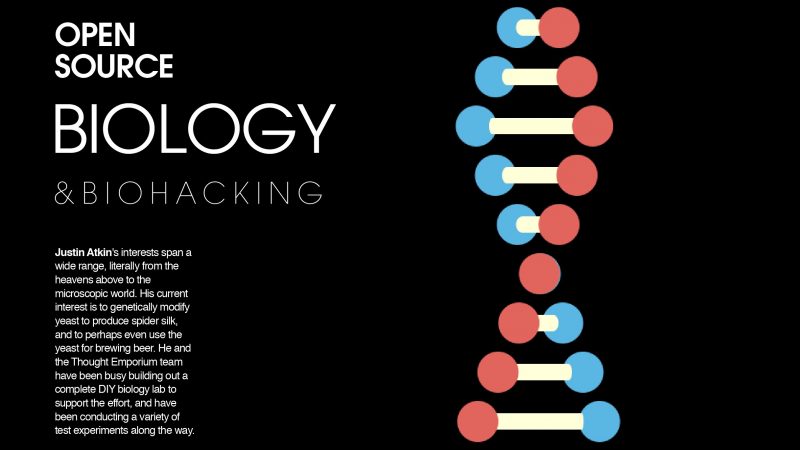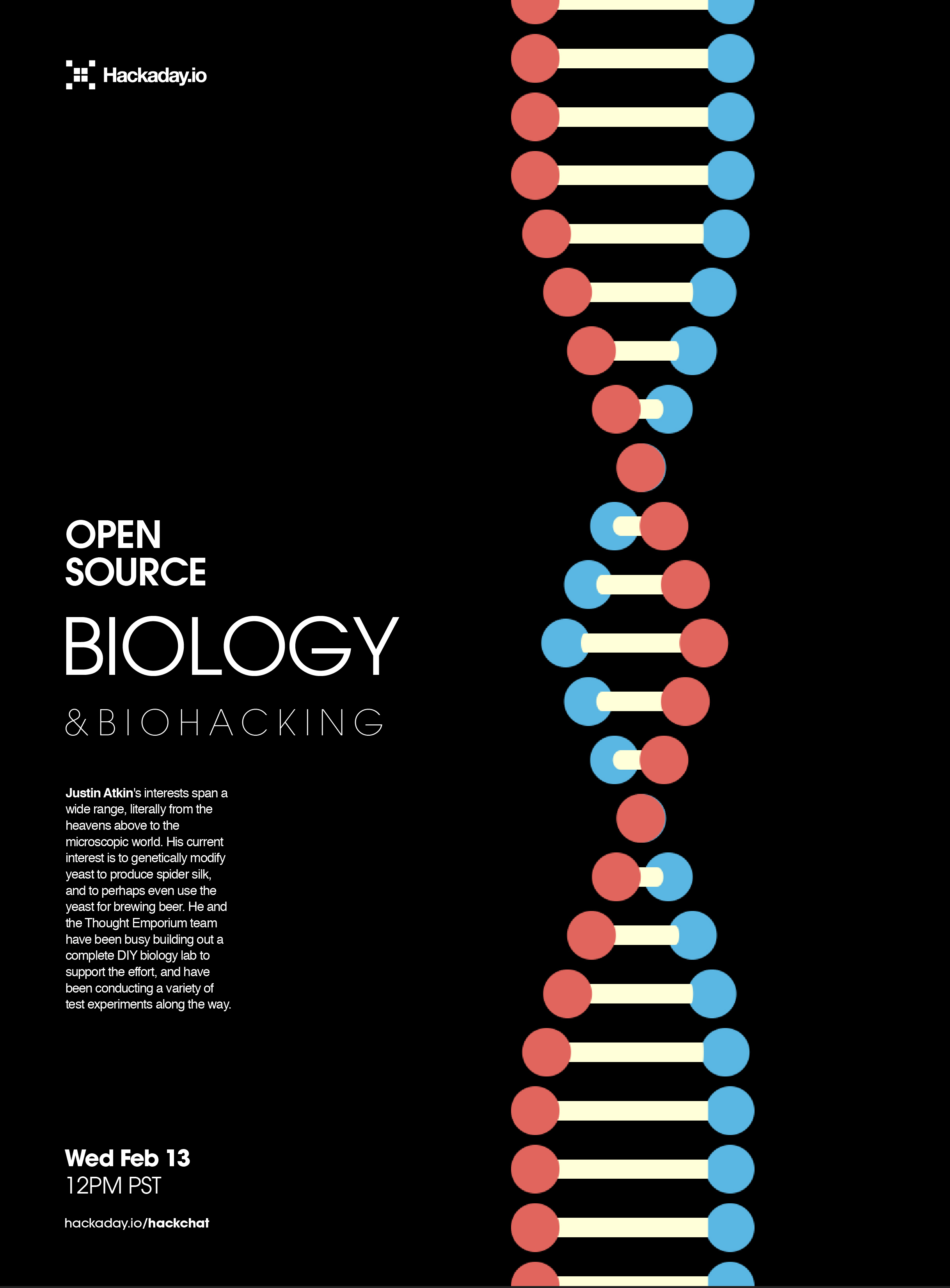Join us on Wednesday at noon Pacific time for the open-source biology and biohacking Hack Chat!
Justin Atkin‘s name might not ring a bell, but you’ve probably seen his popular YouTube channel The Thought Emporium, devoted to regular doses of open source science. Justin’s interests span a wide range, literally from the heavens above to the microscopic world.
His current interest is to genetically modify yeast to produce spider silk, and to perhaps even use the yeast for brewing beer. He and the Thought Emporium team have been busy building out a complete DIY biology lab to support the effort, and have been conducting a variety of test experiments along the way.
Please join us for this Hack Chat, in which we’ll cover:
- The how’s and why’s of yeast genetic engineering;
- What it takes to set up an effective biology lab from scratch;
- An update on the current status of the spider-silk yeast project; and
- Where the open-source biology field is, and where it’s going.
You are, of course, encouraged to add your own questions to the discussion. You can do that by leaving a comment on the Open-Source Biology and Biohacking Hack Chat event page and we’ll put that in the queue for the Hack Chat discussion.
 Our Hack Chats are live community events on the Hackaday.io Hack Chat group messaging. This week we’ll be sitting down on Wednesday, February 13, at noon, Pacific time. If time zones have got you down, we have a handy time zone converter.
Our Hack Chats are live community events on the Hackaday.io Hack Chat group messaging. This week we’ll be sitting down on Wednesday, February 13, at noon, Pacific time. If time zones have got you down, we have a handy time zone converter.
Click that speech bubble to the right, and you’ll be taken directly to the Hack Chat group on Hackaday.io. You don’t have to wait until Wednesday; join whenever you want and you can see what the community is talking about.

















Next Justin can experiment with the Flu virus.
What can go wrong?
What he’s doing is more akin to grafting fruit tree growth buds onto different root stock.
The chances of catastrophe are low as is the impact of this yeast getting out.
I don’t think it’s possible to elucidate your lack of understanding of the subject matter more than you did with that analogy. Congratulations!
But… his analogy isn’t actually that far off.
It’s not dangerous. He’s engineering yeast to produce interesting, benign substances.
He’s not adding antibiotic resistance to the measels or virility to anthrax, he’s making yeast that have spider attributes. Even if he ends up adding venom production or leg genes instead of silk genes, they’re still just yeast. Nothing a little bleach won’t kill
Not that antibiotics do anything to a virus, but my main point stands. This isn’t CDC / bioweapons level research, it’s the type done by undergraduates on a regular basis.
What are you kidding? This has catastrophe written all over is. “His current interest is to genetically modify yeast to produce spider silk, and to perhaps even use the yeast for brewing beer.” He could get cobwebs in his beer!!!!
No need to add isenglass or filter for filling your keg. Think of all the time and cost savings!
“Where the open-source biology field is, and where it’s going.”
Extra limbs so we can hold our projects easier.
President Beeblebrox, I presume?
if you guys are going to send out a notification for a coming event, could you make our lives easier by including a calendar .ics so we don’t forget. It might look like a laziness issue, but really, most of us have multiple mental juggling balls in the air.
Good idea, but hard to implement. I’ll ask the developers about adding it to these posts.
As a workaround, we do have a button on each Hack Chat event page that will add the event to your calendar. Click it and it’ll give you a choice of calendar formats. I know it’s one link deeper, but each post like this has at least two links to the event.
Thanks for the suggestion!
Open source bio, wtf. Virtually all of it is open source. Ignorance of not reading papers doesn’t mean we need some new open source bio. All of that’s ever going to result in is damage to the environment, bio”hackers” with cancer and some nice demos. Modern biology – interestingly it seems people always only imply molecular biology here – is so complex that trying to open source it is like open sourcing GPU design but with nVidia already having published how they do it. It just makes no sense.
Sitting here munching on popcorn in my BSL-4 basement containment shelter. Waiting on the “zombie apocalypse” to get started soon (courtesy of a “bio-hacker” experimenting on live subjects and inadvertently – or – perhaps intentionally, unleashing a virulent contagion that will terror-form the planet into oblivion ! mwah hahahaha!)
Not sure if you’ve ever tried to scrounge up a paper before, but the latest research is far from open source. Unless you consider plunking down a couple hundred bucks for a subscription to a journal that gets you past their paywall as “open source.” I know I don’t. And your faith that “closed source” biology, presumably run by monolithic government agencies and well-funded universities, is any less dangerous or prone to misuse than a few citizen scientists looking to improve their beer or just answer a simple question about the world, is a bit misplaced.
Hello everybody, does anybody know the effects of adding High molecular weight HA (HMWHA) into the human blood stream, I’m trying to figure out how to end ageing. Also, check out my blogs if you want